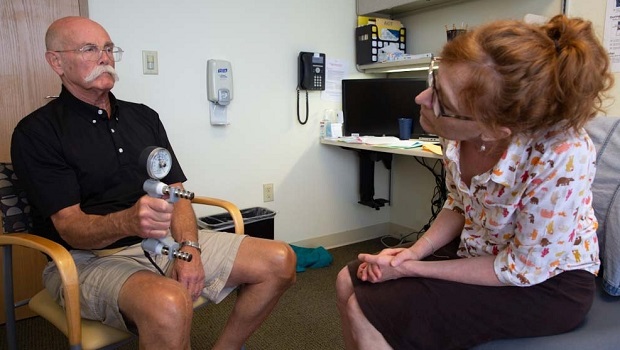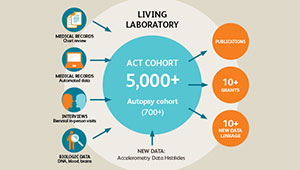The ACT study: Looking toward the future

J. Denis Watts, a participant in the Adult Changes in Thought study, tests his grip strength during a visit with Becky Lederman, a research specialist at the research clinic at Kaiser Permanente Washington Health Research Institute.
At 25 years, the Adult Changes in Thought study is committed to science, collaboration, and jokes, writes Erin Bowles
By Erin Bowles, MPH, senior research associate, Kaiser Permanente Washington Health Research Institute (KPWHRI)
Want to hear a joke? I thought you might!
Where does a neuron keep its money?…A brain bank!
This was just one brain-related joke told at the seventh annual Adult Changes in Thought—or ACT—symposium, held August 12-13 in downtown Seattle.
My KPWHRI colleague KatieRose Richmire and I organize this symposium for the ACT study, a collaboration between KPWHRI and the University of Washington (UW) to learn about healthy aging and dementia including Alzheimer's disease.
The symposium disseminates findings, encourages innovative research ideas, and fosters new collaborations. The first symposium in 2013 was in a KPWHRI conference room. Fewer than 50 people attended, most from around Seattle. This year’s was the largest ever with more than 160 registrants from around the country at the Washington State Convention Center sharing aging-related and dementia research results, collegiality…and jokes.
What did the hippocampus say at his retirement party?…Thanks for the memories!
Why jokes? Why not?! Jokes are a tradition of our team’s monthly meetings, when we discuss our regular visits with ACT study participants. We truly value our study participants, many of whom seem to value humor more than ever as they age. In fact, nearly all of the jokes we share come directly from them!
Speaking of age, the ACT study celebrated its 25th anniversary this year. ACT was first funded by the National Institute on Aging in 1994, inspired by work from the UW Alzheimer’s Disease Patient Registry. ACT originally enrolled nearly 2,600 people aged 65 years or older between 1994-1996. Impressively, 220 are still living today. Since then, ACT has grown to 5,670 adult Kaiser Permanente Washington members.
Long-term commitment and connection
The connection that participants and families feel to the ACT study was evident in a letter read at the symposium by Dr. Eric B. Larson, ACT co-leader with KPWHRI Affiliate Researcher Dr. Paul Crane. We send condolence cards to families when participants die and the daughter of a participant wrote us back! She told us how meaningful her dad’s participation was and that he showed his commitment by donating his brain after death to our neuropathology research. She said she hopes to contribute to our ACT research and participate if ever randomly selected.
The theme of commitment carried through the symposium. UW research staffers Cathy Hutchison and Patti Boorkman presented on ACT participant visits, which are in our KPWHRI clinic or at participants’ homes. Our research staff have driven more than 10,000(!) miles in the past year to visit study participants!
Paul Crane discussed work on how older adults manage multiple chronic conditions. Our Kaiser Permanente Washington electronic health records provide decades of data such as blood pressure measures for hypertension and glucose measures for diabetes. Thanks to the long-term enrollment of ACT participants, we have tens of thousands of data points to analyze associations of these measures with dementia and Alzheimer’s disease.
KPWHRI researchers Rod Walker and Mikael Anne Greenwood-Hickman, with Dr. John Bellettiere from the University of California San Diego discussed the commitment of ACT participants to studying physical and sedentary activity: nearly 1,000 agreed to wear two activity-measuring devices for an entire week, providing us with 24/7 data on their sitting, standing, and stepping activity. This team is analyzing how activity is related to cognitive and physical function in older adults.
KPWHRI Affiliate Researcher Dr. Dirk Keene talked about the ultimate gift to science—more than 800 ACT participants donated their brains at autopsy to our neuropathology research to study dementia and Alzheimer’s disease biomarkers. (Note to self: Next year, try not to schedule the presentation with pictures of sliced up brains right after lunch...oops.)
Which reminds me…If your dog grew up to be a neurologist, what kind of scan would he order?…A PET scan!
The rest of the day focused on the future. One of my favorite parts of the symposium each year is presentations by selected junior researchers. These always generate a lot of discussion and research ideas that we hope will turn into full projects.
The following day, ACT study investigators gave an overview of a massive grant proposal that we submitted in May to fund the next five years of ACT. If funded, we hope to expand our participants to more diverse communities outside Seattle, increase our ability to capture neuroimaging and genetic data, and conduct four innovative projects on the heterogeneity and complexity of, resilience to, and life course epidemiology of aging and dementia.
At the end of this year’s symposium, we acknowledged people who have worked on ACT since it started 25 years ago! These folks have remained committed to ACT and the science of aging and dementia the entire time. They truly deserved the standing ovation (and cake!) at the end of the day.
And we actually give standing ovations for EVERY talk at the ACT symposium. It’s a tradition that started last year, encouraged by KPWHRI's Dr. Dori Rosenberg. Why? 1) it’s better than sitting all day, 2) speakers love it, and 3) IT’S FUN! Try it sometime – you won’t be disappointed.
Speaking of fun…What kind of fish performs brain surgery?…A neuro-sturgeon!
Okay, I promise that’s the last brain joke! So what’s next? The ACT study team is busy moving symposium-generated project ideas forward and thinking about next year’s symposium! The ACT study has always been committed to sharing study ideas, data, and results because the more we share and learn, the closer we come to understanding the debilitating conditions of dementia and Alzheimer’s disease.
But the symposium is just one of the ways we share and learn. We welcome new ideas any time of year. If you are still reading this and have a study idea that might be possible using ACT data—send me an email! I welcome good jokes, too.

ACT study: Long-running study of aging examines changes in Kaiser Permanente patients over time
Drs. Larson and Crane co-lead Kaiser Permanente-University of Washington collaboration learning how to promote healthy aging


